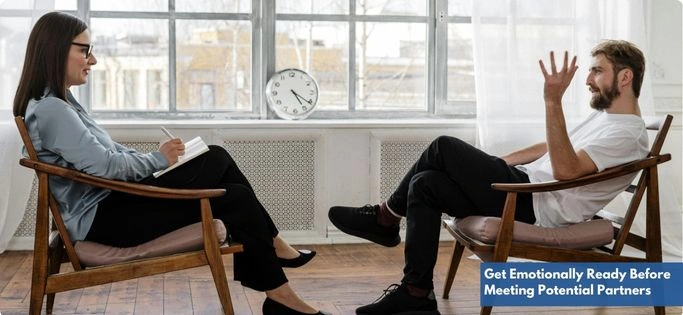Meeting someone new can bring up a mix of feelings, excitement, nervousness, and sometimes a bit of fear. Whether you met them online, app, or through friends, the emotional preparation will shape the entire experience. From personal experience, I’ve found that how I feel walking into that room often matters more than how I look. That’s why we will focus on practical ways to center yourself and show up as your authentic self when meeting potential partners.
You might already have a few questions lined up, but if you don’t, I strongly recommend checking my 11 Must-Ask Questions Before Meeting Potential Partners post. But beyond the talking points, what prepares you emotionally is knowing who you are, what you want, and having a plan for staying grounded.
Remember, emotional readiness isn’t about perfection; it’s about creating space for genuine connection. Even in a casual coffee meet-up, your mindset matters. If you’re carrying stress, unprocessed past hurt, or racing expectations, it’s easy to misread things or feel overwhelmed. I’ve been there, and I can tell you that the small steps you take before the meeting will directly affect whether it’s productive, awkward, or surprisingly good.
But when you take time to prepare mentally, you increase your chances of making meaningful impressions and building relationships with the right foundation. I hope you understand.
Key Takeaways
- Know your relationship values before you meet
- Know what you want and what you don’t
- Don’t overthink, it’s a meeting, not a performance
- Trust your gut feelings during interactions
How to Stop Overthinking Before the Meeting
To stop overthinking, you have to have realistic expectations: an achievable or attainable plan. I’ve had moments where I sat overanalyzing texts, voice notes, or even the location of the meeting. What helped me stop this cycle was taking a step back and asking myself what outcome I wanted: a real connection, not control.
Here’s what you can do:
- Set a time limit to prepare mentally (e.g., 20 minutes to journal, not 2 hours to panic).
- Replace “what-if” thinking with “then-what” solutions. Example: “What if they don’t like me?” becomes “Then I’ll know we weren’t a match.”
- Stay off social media the night before, it tends to stir up comparison or fantasy thinking.
You’ll find that when your mind is clearer, you walk in with more peace. It’s not about ignoring the nerves, it’s about not letting them drive the car. You can try these preparation tips
What to Think About Before Meeting Potential Partners
These are some thoughts you should have before meeting potential partners:
- Why am I meeting this person?
- Am I open to learning about them, or am I trying to impress?
What would make this meeting feel successful for me?
You don’t need a perfect emotional checklist, but a few intentional thoughts can help you walk in feeling balanced. I’ve personally asked myself, and they work.
When I started doing this, I noticed I stopped trying to win someone over. I started being more honest, and oddly enough, that honesty often led to better conversations.
Stop Worrying About Making a Perfect Impression
This one took me years to figure out. If your self-worth is tied to whether someone approves of you, the meeting will feel more like an audition than a connection. I’ve shown up to dates before thinking, “I hope I’m what they’re looking for.” Now I shift it to, “I hope we’re a good fit for each other.”
For what it’s worth:
- Don’t fake agreement just to seem agreeable.
- Wear what makes you feel good, not what you think they want.
- Remind yourself that liking yourself first changes how others respond to you
People in developed countries tend to pick up on confidence quickly, especially in high-profile cities in the U.S., U.K., China, or Canada, where personality often speaks louder than style. Being grounded in who you are sets the tone better than any talking point.
Meeting Potential Partners – How to Stay Calm If You’re Nervous
If you feel nervous, it’s normal, it means you care. But letting anxiety run the show can cause you to miss red flags or push too hard to make things work. What helps is planning how to self-regulate in advance.
Try these tricks if you feel nervous:
- Do breathing exercises in the car or train before you arrive
- Give yourself 10 minutes of silence before the meeting, no scrolling, no texting
- Tell a trusted friend when and where you’re going (and check in after)

This is especially helpful if you’re meeting someone through dating apps or virtual platforms. Some people are in the habit of often rushing to meet in person after a connection in services like Bumble, Hinge, or Match.com, people. Frankly, taking just a little time for yourself before showing up can make a huge difference.
Emotional Boundaries You Need Before Meeting Potential Partners
One of the hardest lessons I had to learn is that emotional availability isn’t the same as emotional overexposure. Early meetings are not the place to overshare deep traumas or life stories. That can come later, if real trust builds.
That is why you should set these boundaries:
- How much you’re willing to share in one meeting
- What questions feel too invasive this early on
- How you’ll handle rejection without taking it personally
Preparing emotionally is only half the work. Knowing the right questions to ask helps you stay centered during the meeting.
These boundaries protect you from people who push too fast or who aren’t emotionally healthy themselves.
How to Handle Fear of Rejection Before Meeting Potential Partners
Fear of rejection can keep you from showing up as yourself. I’ve seen it happen over and over: someone walks into a meeting already worried about being liked. That mindset holds you back from being real, which ironically makes connections harder.
Here’s what works better for most people I’ve worked with, and for me personally:
- Shift how you define rejection
It’s not about your worth. It’s about compatibility, timing, or chemistry. - Ask yourself if you like them
This flips the power dynamic. You’re the chooser, not just the one being evaluated. - Keep meetings low-pressure and practice often
Casual, lower-stakes meetings help reduce the fear over time. - Think of rejection as information
It tells you what works and what doesn’t, nothing more. - Know that everyone experiences it
Confidence isn’t about avoiding rejection. It’s about surviving it and still showing up.
This kind of mental shift won’t happen overnight, but each new interaction becomes easier once you stop aiming for perfection. Over time, rejection just becomes one part of the bigger picture; normal, manageable, and no longer something that defines you.
Ways to Create Emotional Safety Before Meeting Someone New
Emotional safety doesn’t begin mid-conversation; it starts before you even meet. If you show up grounded, with your boundaries clear and your nerves managed, the whole tone of the meeting shifts. I’ve found this especially helpful when meeting someone for the first time.
Here are ways to build that emotional safety from the start:
- Pick the right setting
Avoid loud or chaotic places. Choose relaxed environments, coffee shops, open parks, or quiet cafes. - Decide what you’re comfortable sharing
Have a few light personal stories or insights ready that show who you are without oversharing. - Set mental boundaries before the meeting
Know what topics you’re not ready to talk about, and prepare how to redirect. - Use gentle redirections if needed
Say things like, “That’s something I’d be more comfortable talking about later on.” - Be open without oversharing
Show up as yourself, but pace the depth of your vulnerability so it feels natural.
When both people feel emotionally safe, conversation flows more easily. You’re not performing or protecting, you’re connecting. And that’s what lays the groundwork for stronger potential down the line.
Pay Attention to How You Feel After the Meeting
This is where the real insight comes in. After the meeting, take a few minutes, before calling a friend or jumping to conclusions, and ask yourself:
- Did I feel safe and seen?
- Did I enjoy their energy, or did I feel drained?
- Was I myself, or was I performing?
That reflection is often where the truth is. I’ve ignored this stage in the past and paid for it later. Now, I treat my post-meeting feelings as data, not drama.
How to Recognize Red Flags When Meeting New People
When you’re meeting potential partners, one of the smartest things you can do is to keep your eyes open for early warning signs. I’ve learned the hard way that if you ignore those small signals early on, you often pay for it emotionally down the road. Spotting red flags isn’t about being overly suspicious, it’s about protecting your time, energy, and emotional well-being.
Before the meeting, take a moment to remind yourself of what doesn’t sit right with you. I call it my “red flag list”, behaviors or traits that go against my values or always seem to lead to the wrong kind of dynamic.

During the meeting itself, listen to your gut. Your body picks up on things before your mind can explain them. You might notice:
- Tightness in your chest or shoulders
- A sudden drop in your mood or energy
- Feeling the urge to end the conversation early
- An inner voice saying, “something feels off.”
These are often the early indicators that something’s not aligning. You don’t owe anyone your continued time just because you started a conversation. Red flags are red flags for a reason; honor them!
Final Thoughts
Now that you’ve thought through how to get emotionally ready, I hope you feel more grounded and confident about meeting potential partners. Emotional preparation transforms how you experience meeting potential partners. By taking time to center yourself, clarify your values, and develop healthy expectations, you create the conditions for authentic connection to develop naturally.
The mental work you do before the conversation makes all the difference. That’s something I’ve learned the hard way and now rely on every time. If you’re looking to have better conversations that lead somewhere real, make sure to check out my in-depth article on 11 Must-Ask Questions Before Meeting Potential Partners; they go hand-in-hand with what you just read.
Remember that finding a meaningful connection is both an inner and outer journey. The work you do to prepare emotionally isn’t just about meeting someone else, it’s about showing up as your most authentic self and creating space for relationships that truly enrich your life.
Frequently Asked Questions
What should I think about before meeting someone new?
Focus on your reasons for meeting, your emotional state, and what you truly want, not just surface-level impressions.
How do I know if I’m emotionally ready?
You’re emotionally ready when you feel curious, calm, and not desperate for a specific outcome.
What if I’m too nervous to be myself?
Prep helps with this. Practice grounding techniques and stay off social media before the meeting, as it often triggers doubt.
Should I talk about past relationships?
Keep it light. Save deep details for later. Focus more on who you are now and what you’re looking for.
How do I manage expectations?
Go in with openness, not pressure. Treat the meeting as a chance to connect, not a final judgment.
Can I meet someone if I’m still healing?
You can, as long as you’re not using the meeting to fix emotional pain. Healing should be in motion, not avoided.
Is it okay to feel unsure before the meeting?
Absolutely. Some doubt is healthy. The key is being honest with yourself about what you’re hoping to experience.
What if the meeting goes badly?
Treat it as information, not failure. Every meeting teaches you something, either about them or about yourself.
Should I tell a friend before I go?
Yes, especially if it’s a first-time meeting. Share the location and time with someone you trust.
What are the early red flags I should notice?
Lack of respect for your time, pressuring you emotionally, or inconsistency in what they say versus what they do.











Thanks for the post, can I set it up so I get an update sent in an email whenever you publish a new post?